Singer ánd actor Jean-Claude Pascal (1927-1992) was one of the romantic lovers of the French cinema in the 1950s. In 1961 he won the Eurovision Song Contest for Luxembourg singing 'Nous Les Amoureux'. In 1981 he was less successful with the song 'C'est peut-être pas l'Amérique'.

German postcard by Ufa, Berlin-Tempelhof, no. FK 824. Photo: Lucienne Chevert, Paris.

German postcard by Ufa, Berlin/Tempelhof, no. FK 1384. Photo: Sam Lévin / Union Film.

French postcard by Editions du Globe, Paris, no. 331. Photo: Lucienne Chevert.

French postcard by Editions P.I., Paris, no. 529. Photo: Lucienne Chevert.
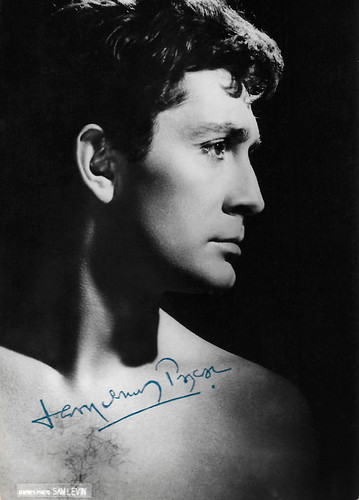
French autograph card. Photo: Sam Lévin.
Jean-Claude Pascal was born as Jean-Claude Henri Roger Villeminot in Paris in 1927, into a family of textile manufacturers.
In 1944, when he was 17, he voluntarily joined the 2e Division blindée (2nd Armored Division) with which he entered the still occupied Strasbourg. Pascal received the Croix de Guerre and later he became a Commandeur des Arts et Lettres and Chevalier de la Légion d'honneur (Legion of Honor).
After the Second World War, he studied at the Sorbonne university, but he started his career as a fashion designer for Hermès.
Later the handsome Pascal met Christian Dior and became his stylist and also his model. He designed the costumes for the stage production 'Don Juan' by Molière, directed by Louis Jouvet.
He then discovered his passion for acting. After attending the drama course of Arthur Ford, he made his stage debut in 1949, alongside Pierre Renoir and Edwige Feuillère in 'La Dame aux Camélias' (Camille). He took the stage name Jean-Claude Pascal.

French postcard, no. 10.

French postcard by Editions du Globe, Paris, no. 648. Photo: Sam Lévin.
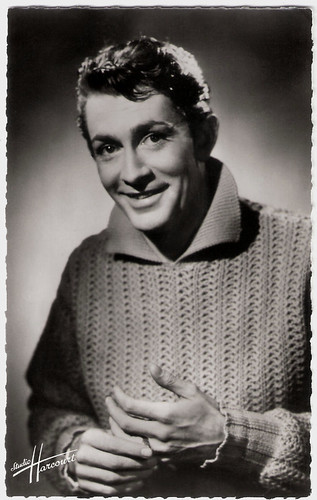
French postcard by Editions du Globe, Paris, no. 255. Photo: Studio Harcourt.

French postcard by Editions du Globe, Paris, no. 399. Photo: Teddy Piaz, Paris.

Dutch postcard by Gebr. Spanjersberg N.V, Rotterdam, no. 4109. Photo: Lucienne Chevert / Unifrance Film / Ufa.
Tall, slender, dark-eyed Jean-Claude Pascal became one of the romantic lovers of the French cinema in the 1950s. His first film as a jeune premier was in the Italian film Quattro rose rosse/Four Red Roses (Nunzio Malasomma, 1949) opposite Olga Villi and Fosco Giachetti.
In France, he appeared with Pierre Fresnay in Un grand patron/Perfectionist (Yves Ciampi, 1951). For this role, his hair was coloured blond.
The following years, he was often seen in costume opposite beautiful women in such films as Le rideau cramoisi/The Crimson Curtain (Alexandre Astruc, 1953) and Les Mauvaises rencontres/Bad Liaisons (Alexandre Astruc, 1955) both with Anouk Aimée, Le Chevalier de la nuit/Knight of the Night (Robert Darène, 1953) with Renée Saint-Cyr, Le Grand Jeu/Flesh and the Woman (Robert Siodmak, 1954) with Gina Lollobrigida, Le Salaire du péché/The Wages of Sin (Denys de La Patellière, 1956) opposite Danielle Darrieux, and Die schöne Lügnerin/The Beautiful Lier (Axel Von Ambesser, 1959) with Romy Schneider.
Although he often played a romantic womaniser on screen, there was no woman in his private life, except for his beloved mother. The French site Hexagon Gay writes that Pascal was gay and liked men: "Only the artistic and gay at the time were aware because it is totally excluded to reveal such an orientation in a society where homophobia is still the rule. (...) The longest relationship he maintained, was with the actor Jean Chevrier, who died in 1975."

Spanish postcard by Toro de Bronze, no. 183, 1964. Photo: Sam Lévin.

Spanish postcard by Postalcolor, Hospitalet (Barcelona), no. 89, 1964. Photo: Sam Lévin.

French postcard by E.D.U.G., no. 203. Photo: Studio Pietri.

French collectors card by Publistar.
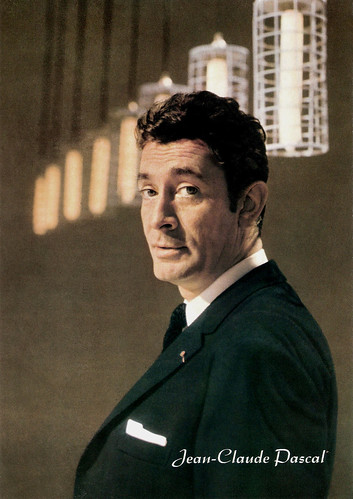
Big East-German card by VEB Lied der Zeit Musikverlag, Berlin, no. 419-440/A 508/69, 1969. Photo: H.J. Hoffmann.
The filmmakers of the Nouvelle Vague were not interested in Jean-Claude Pascal. His film work diminished in the 1960s and he switched to singing chansons such as 'Lily Marlene' in both German and French.
His sultry, deep voice served sensitive interpretations of songs of such (then) young writers as Guy Béart, Serge Gainsbourg and Jean Ferrat. In 1962, he was awarded the Prix de l' Académie Charles-Cros for it.
In 1961 he won the Eurovision Song Contest for Luxembourg singing 'Nous Les Amoureux' (We the Lovers) with music composed by Jacques Datin and lyrics by Maurice Vidalin.
Twenty years later he represented Luxembourg again at the Eurovision Song contest 1981 with 'C'est peut-être pas l'Amérique' (It may not be America) but finished 11th of 20. He composed the words and music of this song himself along with Sophie Makhno and Jean-Claude Petit.
In the meantime he incidentally played in such light entertainment films as Le Rendez-vous/Rendezvous (Jean Delannoy, 1961) with Annie Girardot, the Spanish comedy Las 4 bodas de Marisol/The Four Marriages of Marisol (Luis Lucia, 1967) opposite the young Spanish idol Marisol, and Angélique et le Sultan/Angelique and the Sultan (Bernard Borderie, 1968) with Michèle Mercier.
His last film was the German Krimi Unter den Dächern von St. Pauli/Under the Roofs of St. Pauli (Alfred Weidenmann, 1970). In the 1970s he worked for television and the stage and in the 1980s he wrote detective novels and historical portraits, like 'L'Amant du roi' (The King's Lover) and 'Marie Stuart' (Mary Stuart). In 1986 he published his autobiography 'Le Beau Masque' (The Beautiful Mask).
In 1992 Jean-Claude Pascal died of lung cancer in Clichy-la-Garenne, near Paris. He was 64. There was not much media attention for the passing of this quite forgotten star, who had been so popular during the 1950s and 1960s.
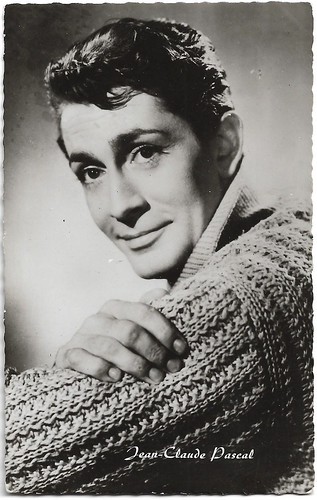
Dutch or Flemish postcard. Editor unknown.

With Marisol. Spanish postcard by Postal Oscar Color, S.A., Hospitalet (Barcelona), no. 702. Publicity card for Las 4 bodas de Marisol/The Four Marriages of Marisol (Luis Lucia, 1967).
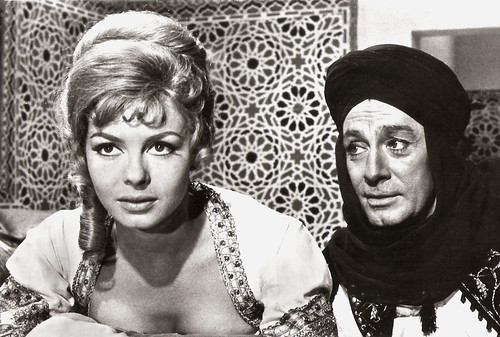
Romanian postcard by Casa Filmului Acin. Photo: Michèle Mercier and Jean-Claude Pascal in Angelique et le sultan/Angelique and the sultan (Bernard Borderie, 1966).

Romanian postcard by Casa Filmului Acin, no. 331. Photo: Michèle Mercier and Jean-Claude Pascal in Angelique et le sultan/Angelique and the sultan (Bernard Borderie, 1966).

East-German postcard by VEB Progress Film-Vertrieb, Berlin, no. 3238, 1968. Retail price: 0,20 MDN. Photo: Steffen.
Jean-Claude Pascal sings 'Nous les amoureux' at the Eurovision Song contest 1961. Source: eurovisionfrancetube (YouTube). On 18March 1961, Jean-Claude represented Luxembourg in the Eurovision Song Contest 1961 in Cannes, France, and he won! With 31 points, he was ahead of the United Kingdom, Switzerland, France, and Denmark.
Jean-Claude Pascal sings 'C'est peut-être pas l'Amérique' at the Eurovision Song contest 1981. Source: Niindelos Taivos (YouTube).
Sources: Dave Thompson (AllMusic), Hexagone Gay (French), Wikipedia and IMDb.

German postcard by Ufa, Berlin-Tempelhof, no. FK 824. Photo: Lucienne Chevert, Paris.

German postcard by Ufa, Berlin/Tempelhof, no. FK 1384. Photo: Sam Lévin / Union Film.

French postcard by Editions du Globe, Paris, no. 331. Photo: Lucienne Chevert.

French postcard by Editions P.I., Paris, no. 529. Photo: Lucienne Chevert.

French autograph card. Photo: Sam Lévin.
Passion for Acting
Jean-Claude Pascal was born as Jean-Claude Henri Roger Villeminot in Paris in 1927, into a family of textile manufacturers.
In 1944, when he was 17, he voluntarily joined the 2e Division blindée (2nd Armored Division) with which he entered the still occupied Strasbourg. Pascal received the Croix de Guerre and later he became a Commandeur des Arts et Lettres and Chevalier de la Légion d'honneur (Legion of Honor).
After the Second World War, he studied at the Sorbonne university, but he started his career as a fashion designer for Hermès.
Later the handsome Pascal met Christian Dior and became his stylist and also his model. He designed the costumes for the stage production 'Don Juan' by Molière, directed by Louis Jouvet.
He then discovered his passion for acting. After attending the drama course of Arthur Ford, he made his stage debut in 1949, alongside Pierre Renoir and Edwige Feuillère in 'La Dame aux Camélias' (Camille). He took the stage name Jean-Claude Pascal.

French postcard, no. 10.

French postcard by Editions du Globe, Paris, no. 648. Photo: Sam Lévin.

French postcard by Editions du Globe, Paris, no. 255. Photo: Studio Harcourt.

French postcard by Editions du Globe, Paris, no. 399. Photo: Teddy Piaz, Paris.

Dutch postcard by Gebr. Spanjersberg N.V, Rotterdam, no. 4109. Photo: Lucienne Chevert / Unifrance Film / Ufa.
Romantic Lover
Tall, slender, dark-eyed Jean-Claude Pascal became one of the romantic lovers of the French cinema in the 1950s. His first film as a jeune premier was in the Italian film Quattro rose rosse/Four Red Roses (Nunzio Malasomma, 1949) opposite Olga Villi and Fosco Giachetti.
In France, he appeared with Pierre Fresnay in Un grand patron/Perfectionist (Yves Ciampi, 1951). For this role, his hair was coloured blond.
The following years, he was often seen in costume opposite beautiful women in such films as Le rideau cramoisi/The Crimson Curtain (Alexandre Astruc, 1953) and Les Mauvaises rencontres/Bad Liaisons (Alexandre Astruc, 1955) both with Anouk Aimée, Le Chevalier de la nuit/Knight of the Night (Robert Darène, 1953) with Renée Saint-Cyr, Le Grand Jeu/Flesh and the Woman (Robert Siodmak, 1954) with Gina Lollobrigida, Le Salaire du péché/The Wages of Sin (Denys de La Patellière, 1956) opposite Danielle Darrieux, and Die schöne Lügnerin/The Beautiful Lier (Axel Von Ambesser, 1959) with Romy Schneider.
Although he often played a romantic womaniser on screen, there was no woman in his private life, except for his beloved mother. The French site Hexagon Gay writes that Pascal was gay and liked men: "Only the artistic and gay at the time were aware because it is totally excluded to reveal such an orientation in a society where homophobia is still the rule. (...) The longest relationship he maintained, was with the actor Jean Chevrier, who died in 1975."

Spanish postcard by Toro de Bronze, no. 183, 1964. Photo: Sam Lévin.

Spanish postcard by Postalcolor, Hospitalet (Barcelona), no. 89, 1964. Photo: Sam Lévin.

French postcard by E.D.U.G., no. 203. Photo: Studio Pietri.

French collectors card by Publistar.

Big East-German card by VEB Lied der Zeit Musikverlag, Berlin, no. 419-440/A 508/69, 1969. Photo: H.J. Hoffmann.
Eurovision
The filmmakers of the Nouvelle Vague were not interested in Jean-Claude Pascal. His film work diminished in the 1960s and he switched to singing chansons such as 'Lily Marlene' in both German and French.
His sultry, deep voice served sensitive interpretations of songs of such (then) young writers as Guy Béart, Serge Gainsbourg and Jean Ferrat. In 1962, he was awarded the Prix de l' Académie Charles-Cros for it.
In 1961 he won the Eurovision Song Contest for Luxembourg singing 'Nous Les Amoureux' (We the Lovers) with music composed by Jacques Datin and lyrics by Maurice Vidalin.
Twenty years later he represented Luxembourg again at the Eurovision Song contest 1981 with 'C'est peut-être pas l'Amérique' (It may not be America) but finished 11th of 20. He composed the words and music of this song himself along with Sophie Makhno and Jean-Claude Petit.
In the meantime he incidentally played in such light entertainment films as Le Rendez-vous/Rendezvous (Jean Delannoy, 1961) with Annie Girardot, the Spanish comedy Las 4 bodas de Marisol/The Four Marriages of Marisol (Luis Lucia, 1967) opposite the young Spanish idol Marisol, and Angélique et le Sultan/Angelique and the Sultan (Bernard Borderie, 1968) with Michèle Mercier.
His last film was the German Krimi Unter den Dächern von St. Pauli/Under the Roofs of St. Pauli (Alfred Weidenmann, 1970). In the 1970s he worked for television and the stage and in the 1980s he wrote detective novels and historical portraits, like 'L'Amant du roi' (The King's Lover) and 'Marie Stuart' (Mary Stuart). In 1986 he published his autobiography 'Le Beau Masque' (The Beautiful Mask).
In 1992 Jean-Claude Pascal died of lung cancer in Clichy-la-Garenne, near Paris. He was 64. There was not much media attention for the passing of this quite forgotten star, who had been so popular during the 1950s and 1960s.

Dutch or Flemish postcard. Editor unknown.

With Marisol. Spanish postcard by Postal Oscar Color, S.A., Hospitalet (Barcelona), no. 702. Publicity card for Las 4 bodas de Marisol/The Four Marriages of Marisol (Luis Lucia, 1967).

Romanian postcard by Casa Filmului Acin. Photo: Michèle Mercier and Jean-Claude Pascal in Angelique et le sultan/Angelique and the sultan (Bernard Borderie, 1966).

Romanian postcard by Casa Filmului Acin, no. 331. Photo: Michèle Mercier and Jean-Claude Pascal in Angelique et le sultan/Angelique and the sultan (Bernard Borderie, 1966).

East-German postcard by VEB Progress Film-Vertrieb, Berlin, no. 3238, 1968. Retail price: 0,20 MDN. Photo: Steffen.
Jean-Claude Pascal sings 'Nous les amoureux' at the Eurovision Song contest 1961. Source: eurovisionfrancetube (YouTube). On 18March 1961, Jean-Claude represented Luxembourg in the Eurovision Song Contest 1961 in Cannes, France, and he won! With 31 points, he was ahead of the United Kingdom, Switzerland, France, and Denmark.
Jean-Claude Pascal sings 'C'est peut-être pas l'Amérique' at the Eurovision Song contest 1981. Source: Niindelos Taivos (YouTube).
Sources: Dave Thompson (AllMusic), Hexagone Gay (French), Wikipedia and IMDb.
2 comments:
Comment la France a t-elle pu oublier un aussi immense talent que lui c'est impossible ou volontaire parce qu'il dérangeait et avait autant de talent tant en tant qu'acteur chanteur ou écrivain. :(
Comment la France a t-elle pu oublier un aussi immense talent que lui c'est impossible ou volontaire parce qu'il dérangeait et avait autant de talent en tant qu'acteur chanteur ou écrivain :(
Post a Comment